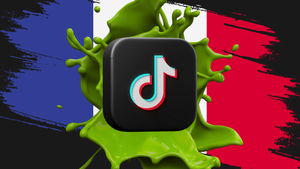A Parliamentary Commission in France has recommended that children under fifteen should be banned from using social media, while young people aged fifteen to eighteen should face an overnight ‘digital curfew’, so that access to apps would be cut off between 10pm and 8am. The proposals follow moves in Australia to ban children under the age of sixteen from using social media platforms.
TikTok comes in for particular criticism from French politicians, who say the short form video app is like a “slow poison” to children and offers an “ocean of harmful content” that is pushed to young people by the platform’s algorithm. One of the MPs who chaired the Commission, Arthur Delaporte, has even referred TikTok to Paris prosecutors for allegedly failing to protect users from harmful content.
According to The Guardian, he told broadcaster FranceInfo: “The conclusion is clear: TikTok has deliberately endangered the health and lives of its users. That is why I have decided to refer the matter to the Paris public prosecutor”.
“It seems to me that there are offences of a criminal nature, of active complicity”, he added, before basically accusing TikTok executives of lying, stating, “when TikTok executives came to see us, they told us that they were unaware of anything - and I believe that this also constitutes perjury”.
TikTok faces regulatory woes in multiple countries of course, which could ultimately impact on the platform’s reach, and in turn on the artists, creators and record labels that rely on the app as a key marketing and fan engagement platform.
In some countries it is the ownership of TikTok by China-based ByteDance that is the main cause for concern, because of allegations the Chinese government has access to user data via ByteDance.
In the US, last year Congress told ByteDance to sell the app’s US operations or face a ban, though the deadline for doing so has been repeatedly postponed by President Donald Trump, who says he’s got a group of American billions ready to do a deal with the Chinese company. It’s assumed Trump will extend that deadline yet again this month.
In India, where TikTok has been banned since June 2020, there were recently rumours that the app might be returning. But the government’s Ashwini Vaishnaw told reporters this week that that isn’t happening, stating “there is absolutely no proposal which has come from any quarters” regarding withdrawing the country’s TikTok ban.
Data security concerns have been raised in other countries, alongside other concerns about the impact of harmful content available on the platform - and on other social media - especially when accessed by young people. That includes abusive content and misinformation, as well as videos that encourage harmful conduct in the real world.
The French Parliament set up a committee to examine the impact of TikTok on young people after a lawsuit in 2024 filed by seven families who accused the platform of exposing their children to content that could lead them to taking their own lives.
The committee’s report is pretty damning of TikTok, and also recommended that a public information campaign be instigated to ensure parents are aware of the harmful content their children may be exposed to on social media platforms.
Perhaps unsurprisingly, a spokesperson for TikTok says the company “categorically rejects” the Commission’s “misleading characterisation of our platform that attempts to scapegoat our company on industry-wide and societal challenges”.
They then insisted that “TikTok has an ongoing, robust trust and safety programme with more than 70 features and settings designed specifically to support the safety and wellbeing of teens and families on our platform”.

